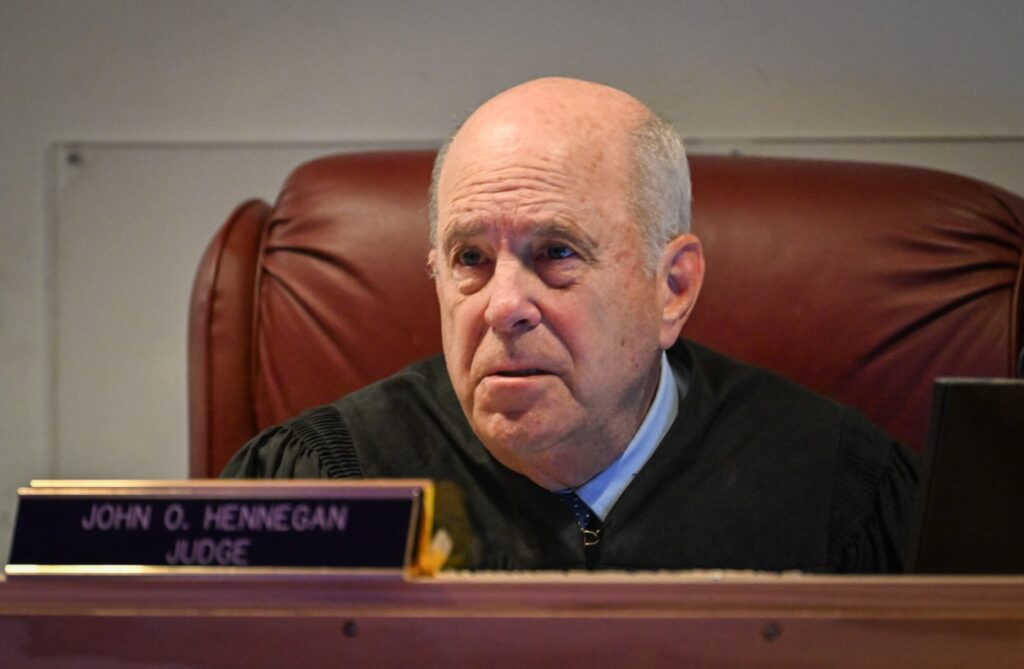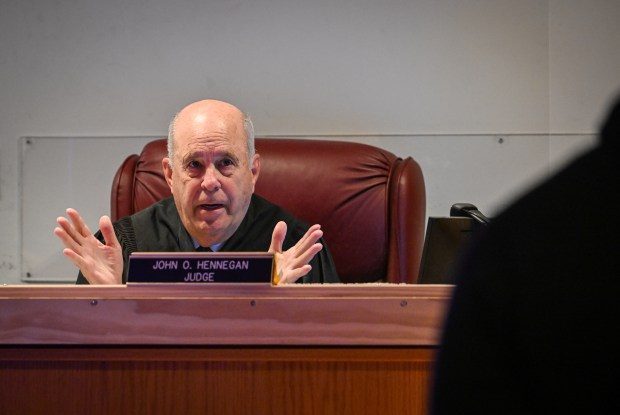For 20 years, Baltimore County program has helped parents behind on child support find jobs
- December 28, 2023

Randy Frith is happy to brag about his 9-year-old daughter. He keeps a photo of her, pigtailed and smiling, ready on his phone. He is quick to reveal that she’s on her school’s honor roll and a cheerleader.
But Frith, 38, has failed to pay child support payments to his daughter’s mother, which landed him in early December in Baltimore County Circuit Judge John O. Hennegan’s courtroom.
For nearly 20 years, Hennegan has led a program in Baltimore County that seeks to apply an intuitive solution to the problem of parents who don’t pay what they owe in child support: helping “noncustodial parents” stabilize their lives and get jobs that pay well enough that they can meet their obligations.
The Family Employment and Support Program, Hennegan said in an interview with The Baltimore Sun, has meant more dollars going to fund kids’ essential needs, as well as offered a hand up for adults who have benefited from employment and the confidence that comes from showing up financially for their children.
The program is largely Hennegan’s initiative, started in 2004 with the help of a federal grant. He retired as a judge in 2009, but has continued to hear cases as a senior judge.
Chief Court Employment Coordinator Lisa Gabriel connects those in the program with resources, including education and job training, mental health treatment or addiction recovery help. Participants agree to conditions, including checking in weekly to make sure they are applying to jobs.
During Hennegan’s Dec. 7 docket for the program, Gabriel said she would help Frith find new housing that would better support his addiction recovery. She also identified a career path out of his natural gift for convincing others: “I think Mr. Frith would be a good candidate for a peer-to-peer recovery support specialist,” she said.
More than 60 people participated in 2023, Gabriel said. The program’s work slowed during the coronavirus pandemic, which closed the courts and delayed cases.
Mental health and substance abuse issues are common obstacles to finding steady work for participants, sometimes coupled with a criminal record. Gabriel said she also works frequently with homeless parents.
“That’s one resource that is very limited,” she said of housing.

The consequences for chronically failing to pay child support are serious: People lose their driver’s licenses and professional licenses automatically, money can be taken directly out of their paychecks and they can serve jail time. Being unable to drive can make it even harder to get a job, but those in Hennegan’s program can get their licenses back if they show they are applying for work.
In contrast to many of the interactions between judges and defendants in Baltimore County’s courtrooms, the scene in Hennegan’s courtroom is particularly humane.
After questioning Brandon Workenaour, 40, about his life, including a stint living in a wooded area of Dundalk, his struggles with addiction and his hopes of entering a culinary program, Hennegan posed a question: “What can we do to make your life better?”
“When you come in front of a judge, something’s going on that’s not good,” Hennegan said in an interview. “You’re in big trouble, you’re nervous and you’re scared and you don’t feel like you can talk to the judge. Here, in the [Family Employment and Support] program, I’m getting them to talk to me. ‘What’s the problem? Why are you having these difficulties?’”
However, Hennegan dismisses excuses he finds unsatisfying, reminding participants that contributing to their children’s lives financially is an obligation that surpasses their own struggles. On Dec. 7, he turned off court recording equipment to tell Frith about his own experience overcoming loss.
“Can you do it? If I can do it?” he asked Frith. “We’ll be there for you.”
In the program’s first year, it increased child support collections by $5,000, Hennegan said. That soared to $1 million in the program’s second year.
Hennegan said he no longer tracks how many dollars the program collects. As of the end of September, its 62 participants had paid about $91,600 in 2023, according to the Maryland Department of Human Services. In Baltimore County, parents were paying arrears, or past due payments, in 68% of cases, which is higher than the statewide average.
Participants can join the program voluntarily if they tell the Baltimore County child support office that they are struggling to find employment or a magistrate judge can refer them to Hennegan’s docket. Gabriel and attorneys also can determine before a hearing if someone is unemployed and may be a good candidate.
Parents who don’t make payments can be found in civil contempt of a court order, which can lead to jail time. In some cases, they can be charged with criminal contempt.
Until November, Maryland assistant attorney generals handled both civil and criminal contempt cases for child support in Baltimore County for many years. Those attorneys no longer will bring criminal cases, a move a spokesperson for the Maryland Attorney General’s Office said was made to “ensure consistent practices” across the 18 counties where its attorneys represent the local office of child support.
Baltimore County State’s Attorney Scott Shellenberger said Dec. 15 his office is exploring how these criminal cases will be handled going forward.
“Somebody needs to do it: The question is who,” Shellenberger said.
Since the 1970s, efforts to collect child support nationally and in Maryland have shifted away from more punitive approaches that relied on criminal enforcement.
“Prosecutions for criminal contempt and nonsupport are just one enforcement tool available,” said attorney general spokesperson Jennifer Donelan in an email to The Sun. Other tools include administrative enforcement such as intercepting taxes or earnings, revoking passports or garnishing financial accounts, along with judicial approaches like filing liens or the civil contempt process.
On Dec. 5, Gabriel began the process to sign Robert Galloway Jr. up for the program. Galloway, a 39-year-old with an 11th grade education, said he was having trouble finding a job and had his driver’s license taken away.
Hennegan told Galloway he could sign an order reinstating his license and enroll him in a program to obtain his high school diploma.
“We can help you get a really good career, if all the dominoes line up,” the judge said.
Sign Up For Our
Newsletter
Each day, we honor and remember those who have recently passed away.
Most Viewed
More
- Article Obituaries
- Celebrities
- Celebrity News
- Local
- News
- News & Advice
- NFL
- NHL
- Northside
- Norwin
- Obituaries
- Obituary
- Penn Hills
- Pirates
- Pitt
- Pittsburgh
- Plum
- Politics Election
- Sports
- Steelers
- Theater Arts
- Top Stories
- Travel
- Tribune Review Obituaries
- US-World
- Valley News Dispatch
- West End
- Westmoreland
- World